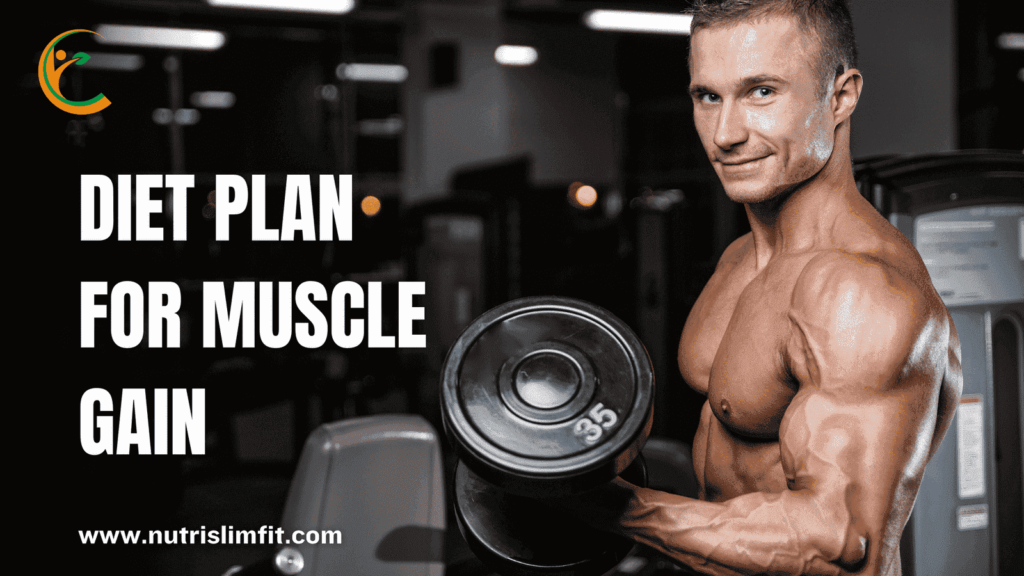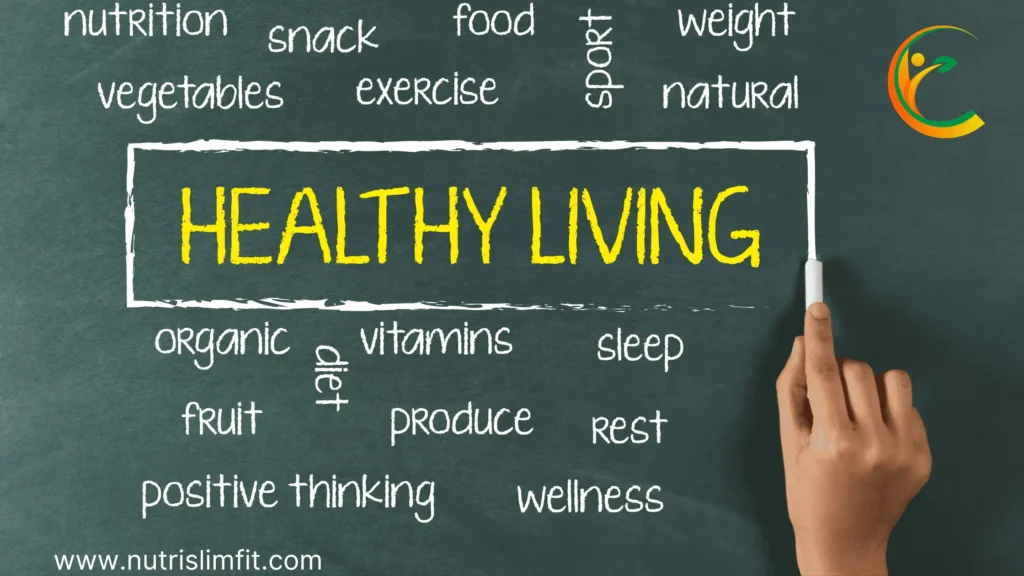Gaining muscle requires a commitment to strength training and getting enough protein and calories. While supplements can help, your diet is key for building muscle mass. This article provides diet tips to help naturally gain lean muscle without excess body fat. Diet Plans To Gain Muscle guide includes sample meal plans and foods to eat, along with nutrition guidance for muscle growth.

Why Diet Plans for Muscle Gain Is Important
You need a calorie surplus to gain weight and add muscle. Without eating more calories than you burn, your body lacks the energy and materials to increase muscle tissue.
- Getting enough protein is crucial. Protein provides amino acids that are the building blocks for growing and repairing muscles.
- The right carb and fat balance optimizes hormones for muscle growth, such as testosterone and insulin.
- Well-timed nutrients support muscle protein synthesis (MPS). MPS is the process of building new muscle tissue. Eating protein and carbs around workouts maximizes MPS.
- Following a nutrition plan designed for muscle gain makes it far more likely you’ll achieve your fitness goals. Diet and exercise go hand-in-hand when it comes to getting bigger muscles.
How Many Calories You Need
- Determining your calorie needs for muscle gain requires a calorie calculator or TDEE (total daily energy expenditure) calculator.
- Here’s an overview of utilizing your cutting, maintenance, or bulking calories for gaining muscle:
- Cutting calories: A calorie deficit causes weight and muscle loss. Do not attempt to gain muscle mass while cutting.
- Maintenance calories: Your existing calorie intake maintains your current weight. It’s unlikely you can gain significant muscle without a surplus.
- Bulking calories: A calorie surplus supports muscle gain by providing extra energy and nutrients. Aim for a 10-20% calorie surplus.
- Use a calorie calculator to estimate your total daily energy expenditure (TDEE). Then, increase your calories by 15% for a moderately aggressive muscle-building surplus.
- Re-evaluate your calorie needs every 4 weeks. Gain no more than 0.25-0.5% of your body weight weekly to build muscle without major fat gain.
How Much Protein You Need Daily
Research consistently shows higher protein intakes help build more muscle, especially when combined with strength training. Current recommendations are:
- Sedentary adults: 0.8 grams of protein per pound (1.8 grams per kg) of body weight
- Strength training adults: 0.7-1 grams protein per pound (1.6-2.2 gram per kg) of body weight
- So if you weigh 180 pounds (82 kg), that’s 126-180 grams of protein daily for muscle gain without supplements. Active individuals and athletes benefit from the higher end of the spectrum.
- Spread out your protein intake evenly throughout the day. Eat around 20-40 grams per meal, with 0.25-0.3 grams per kg of body weight in each meal.
Sample Muscle Building Diets and Meal Plans
The following sample diets provide calorie and macronutrient breakdowns tailored for gaining lean muscle:
3,000 Calorie Clean Bulking Diet
This diet contains a 15% calorie surplus for an 80 kg/175-pound male with an active lifestyle and heavy strength training.
Total Calories: 3000
- Protein: 160 grams (0.4g/lb body weight)
- Carbs: 380 grams
- Fat: 80 grams (25% calories)
Sample Meals
Breakfast: Oatmeal (1 cup dry) + scoop whey + banana + nuts
- Calories: 650
- Protein: 35g
Snack: Greek yogurt (1 cup) + berries
- Calories: 231
- Protein: 15g
Lunch: Chicken rice bowl with veggies
- Calories: 650
- Protein: 50g
Pre-workout: Rice cakes with peanut butter
- Calories: 350
- Protein: 15g
Dinner: Steak (6 oz), sweet potato (1 large), greens
- Calories: 650
- Protein 50g
- Snack: Cottage cheese (1 cup) + pineapple
- Calories: 200
- Protein: 25g
- 3,500 Clean “Lean Gains” Bulking Diet
- This diet uses a more aggressive 20% calorie surplus for someone doing an intense bulk while trying to minimize fat gain.
Total Calories: 3500
Protein: 180 grams (0.5g/lb body weight)
Carbs: 440 grams
Fat: 80 grams (20% calories)
Follow the sample meals above but increase carbs and calories from grains, fruits, veggies, and high-protein foods. Stick to healthy minimally processed choices as much as possible.
Foods to Eat for Muscle Gain
Focus on getting enough calories and protein from wholesome minimally processed foods. These include:
Protein Foods:
- Beef
- Chicken
- Fish and seafood
- Eggs and egg whites
- Milk and Greek yogurt
- Protein powder (whey, casein)
- Cottage cheese
Carb Foods:
- Whole grains (oatmeal, brown rice, whole wheat bread)
- Starchy veggies (potatoes, sweet potatoes)
- Beans and lentils
- Fruits (bananas, berries)
Healthy Fats:
- Nuts and seeds
- Nut butters
- Avocados
- Oils (olive oil, avocado oil)
- Fatty fish (salmon)
When to Eat to Building Muscle
Pre-workout: 1-2 hours before training eat a carb and protein-rich meal or snack to provide workout fuel. Good choices are oatmeal with whey or a banana with Greek yogurt.
Post-workout: Immediately after your workout consume quick digesting carbs plus a fast protein like whey. This spikes insulin and feeds muscles when they are primed to synthesize new muscle proteins. Examples include whey + dextrose powder or a banana + whey smoothie.
Nighttime: Take 30-40 grams of slow-digesting casein protein before bed to feed muscles all night long. Or have cottage cheese with pineapple or nuts.
Supplements that Help Muscle Growth
While whole foods should make up the majority of your muscle-building diet, certain supplements can provide additional benefits for Diet Plans To Gain Muscle:
- Whey protein powder: Fast digesting and high in the amino acid leucine, ideal for pre and post-training.
- Creatine monohydrate: Increases power output, boosts post-workout MPS, and may support greater muscle gains with strength programs.
- Beta-alanine: Reduces lactic acid buildup for increased muscular endurance to push more reps per set.
- Citrulline or agmatine: Both increase nitric oxide for incredible muscle pumps that stretch and fatigue fibers.
- Branched-chain amino acids (BCAAs): Provides workout fuel plus the 3 key amino acids for stimulating MPS.
While not required, many lifters find adding select supplements gives them an extra edge to gain more muscle. Just don’t neglect whole food nutrition and proper training – those remain the most crucial!
Putting It All Together
Gaining lean muscle requires proper nutrition paired with a sound workout program focusing on compound lifts and progressive overload. Make certain you’re eating in a calorie surplus while getting enough protein distributed evenly throughout the day. Follow Proper Diet Plans To Gain Muscle in effective way.
Time nutrients appropriately around workouts to optimize results. Allow for gradual weight gain over time while limiting fat accumulation. Finally, incorporate supplements judiciously to give yourself an added push toward greater muscle growth!
Focus on these fundamentals with consistency and dedication to see your hard work rewarded. Feel free to tweak macros and calories as needed over time. Just remain patient – building an impressive physique takes years for most natural lifters.


